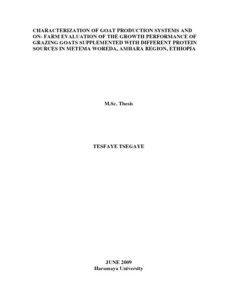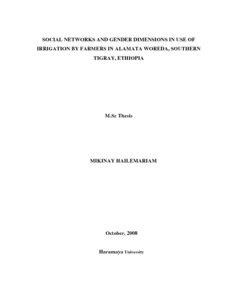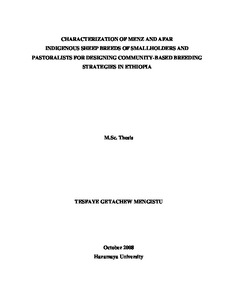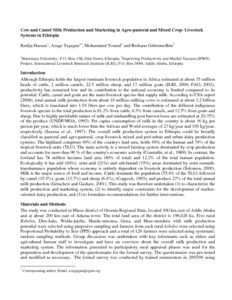Location
Vision
Haramaya University strives to be one of the leading African Universities with international reputation by 2025.
Mission
The Mission of Haramaya University is to produce competent graduates in diverse fields of study, undertake rigorous, problem solving and cutting edge researches,disseminate knowledge and technologies, and provide demand-driven and transformative community services.
Motto
The motto of Haramaya University is “Building the Basis for Development”
Goal
The goal of Haramaya University is to evolve as an autonomous and independent (academic and research institution) graduate and research university with a competitive national and international quality and relevance standards in its academic, research and community services endeavours.
Members:
Resources
Displaying 26 - 30 of 36Characterization of goat production systems and on- farm evaluation of the growth performance of grazing goats supplemented with different protein sources in Metema Woreda, Amhara Region, Ethiopia
The study was carried out in Metema Woreda of Amhara National Regional State. The objectives of the study were to describe the goat production systems in the study area and to identify major constraints and opportunities of goat productivity; to evaluate the effect of supplementation with different protein sources on live weight gain of grazing goats under farmers management and to evaluate the economic feasibility of the feeding system under farmers condition.
Traditional cow and camel milk production and marketing in agropastoral and mixed crop-livestock systems: the case of Mieso District, Oromia Regional State, Ethiopia
This study was conducted to characterize the traditional milk production and marketing system, and to identify constraints and opportunities for further development. It was conducted in Mieso District of Oromia Regional State, located 300 km east of Addis Ababa and at about 200 km east of Adama. Five rural kebeles, Dire Kalu, Gena, Huse Mendera, Hunde Misoma and Welda Jejeba, that have milk production potential were selected. Farmers/agro-pastoralists from each rural kebele were also selected.
Social networks and gender dimensions in use of irrigation by farmers in Alamata Woreda, Southern Tigray, Ethiopia
Access to input / technology, information / knowledge, credit / finance is very decisive for the development of a given society in general and irrigation based high value crop production in particular. The identification of the contribution of social networks in facilitating access to these resources and services and thereby influence crop choice among irrigation user farmers is vital to identify the important actors contributing in irrigation based vegetable production.
Characterization of Menz and Afar indigenous sheep breeds of smallholders and pastoralists for designing community-based breeding strategies in Ethiopia
This study aimed at understanding of existing sheep breeding practices, identifying sheep breeding goals and characterizing the morphological and biometrical characters of Menz and Afar sheep breeds in their habitat as a step towards developing sustainable sheep breeding strategy. The study was conducted by implementing single visit questionnaire, observing and recording of sheep morphological characters, and by recording body weight and body measurements. The survey revealed that the mean sheep flock size per household was 31.6 in Menz and 23.0 in Afar area.






